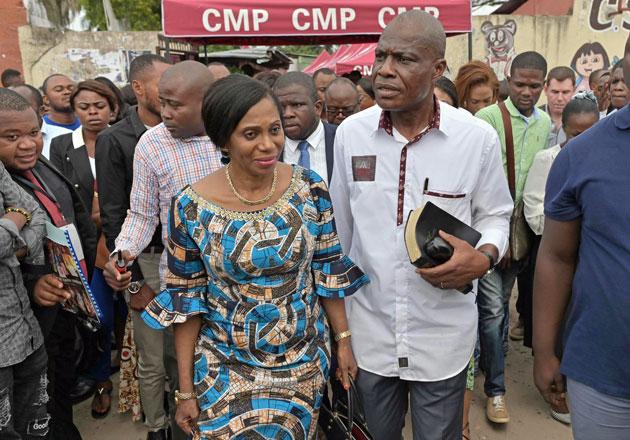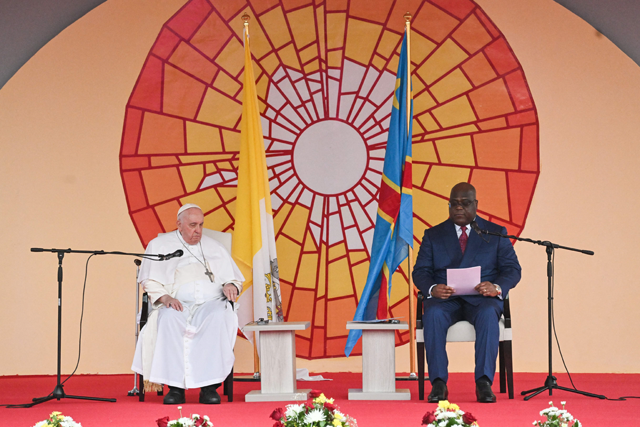You are here
Congo should recount presidential election vote — southern African bloc
By Reuters - Jan 13,2019 - Last updated at Jan 13,2019

Opposition presidential candidate in the Democratic Republic of the Congo, Martin Fayulu (centre right), leaves the Centre Missionnaire Philadelphie with his wife Esther after they attended a Sunday mass on January 13 in the capital Kinshasa (AFP photo)
By Giulia Paravicini
KINSHASA — An influential African bloc urged the Democratic Republic of the Congo (DRC) on Sunday to recount votes cast in its disorganised presidential election, raising pressure on Kinshasa to ensure the legitimacy of the next government and avert widespread violent unrest.
The December 30 vote was supposed to mark Congo’s first uncontested democratic transfer of power in 59 years of independence, and the beginning of a new era after 18 years of chaotic rule by President Joseph Kabila.
But irregularities including faulty voting machines, poorly run polling stations and a halt in the vote for over a million people due to insecurity and an Ebola outbreak in opposition strongholds, have overshadowed talk of democratic progress.
Sunday’s intervention by the Southern African Development Community (SADC), which contains regional allies of Kinshasa like South Africa and Angola, could push Kabila to tackle the presidential runner-up’s accusations that the vote was rigged.
Second-place finisher Martin Fayulu says he in fact won by a landslide and that the official winner, opposition leader Felix Tshisekedi, struck a deal with Kabila to be declared the victor. Tshisekedi and Kabila deny this.
Isolated post-election violence in the country of 80 million people that sprawls across central Africa, has many fearing a return to the kind of conflict and upheaval that has killed millions since the 1990s.
The DRC is the world’s leading miner of cobalt, a mineral used in electric car batteries, Africa’s biggest copper producer and also mines gold and diamonds.
International pressure on Kabila has been building since the vote, in part because the DRC’s influential Catholic Church said that tallies compiled by its 40,000-strong monitoring team show a different winner to that announced by the electoral commission, without saying who.
France, Belgium, the United States and Britain have all expressed concern about the vote.
But the SADC will hold greater sway in Congo. Its approval of the election results are critical for the legitimacy of president-elect Tshisekedi’s new government.
SADC previously said the election went “relatively well” despite some problems. But on Sunday it said it had taken note of the “strong doubts” cast on the poll by the church.
“A recount would provide the necessary reassurance to both winners and losers,” a SADC statement said.
Credibility at stake
The church’s bishops conference, known as CENCO, was not immediately available for comment on Sunday, nor were spokespeople for Kabila and Tshisekedi.
But Fayulu, who has already called for a recount, welcomed the announcement.
“It is essential that this process of recounting and validating the real results be carried out in all transparency, in order to proclaim the real winner,” he said in an e-mailed statement.
“The credibility of the process is at stake.”
The 16-nation SADC also recommended a government of national unity including parties representing Kabila, Fayulu and Tshisekedi that could promote internal peace.
“SADC draws the attention of Congolese politicians to similar arrangements that were very successful in South Africa, Zimbabwe and Kenya [that created the] necessary stability for durable peace,” the statement said.
The chances of this kind of unity in the DRC appear slim for now. Fayulu, who is backed by bitter political rivals of Kabila, on Saturday filed an election complaint with the constitutional court to have the result overturned.
Meanwhile, Kabila’s ruling coalition won a majority in legislative elections, according to results announced on Saturday.
This will undercut Tshisekedi’s ability to deliver on campaign promises and fuels suspicions in Fayulu’s camp that Kabila will retain influence over important ministries and the security forces after stepping down.
Related Articles
KINSHASA — Martin Fayulu, who came second in the Democratic Republic of Congo’s (DRC) presidential election, has appealed to the constitutio
KINSHASA — Prosecutors and senators in the Democratic Republic of the Congo (DRC) have launched new moves against the camp of former preside
KINSHASA — Pope Francis landed in the Democratic Republic of the Congo (DRC) on Tuesday, hailing his “beautiful trip” to Africa as he comes


















